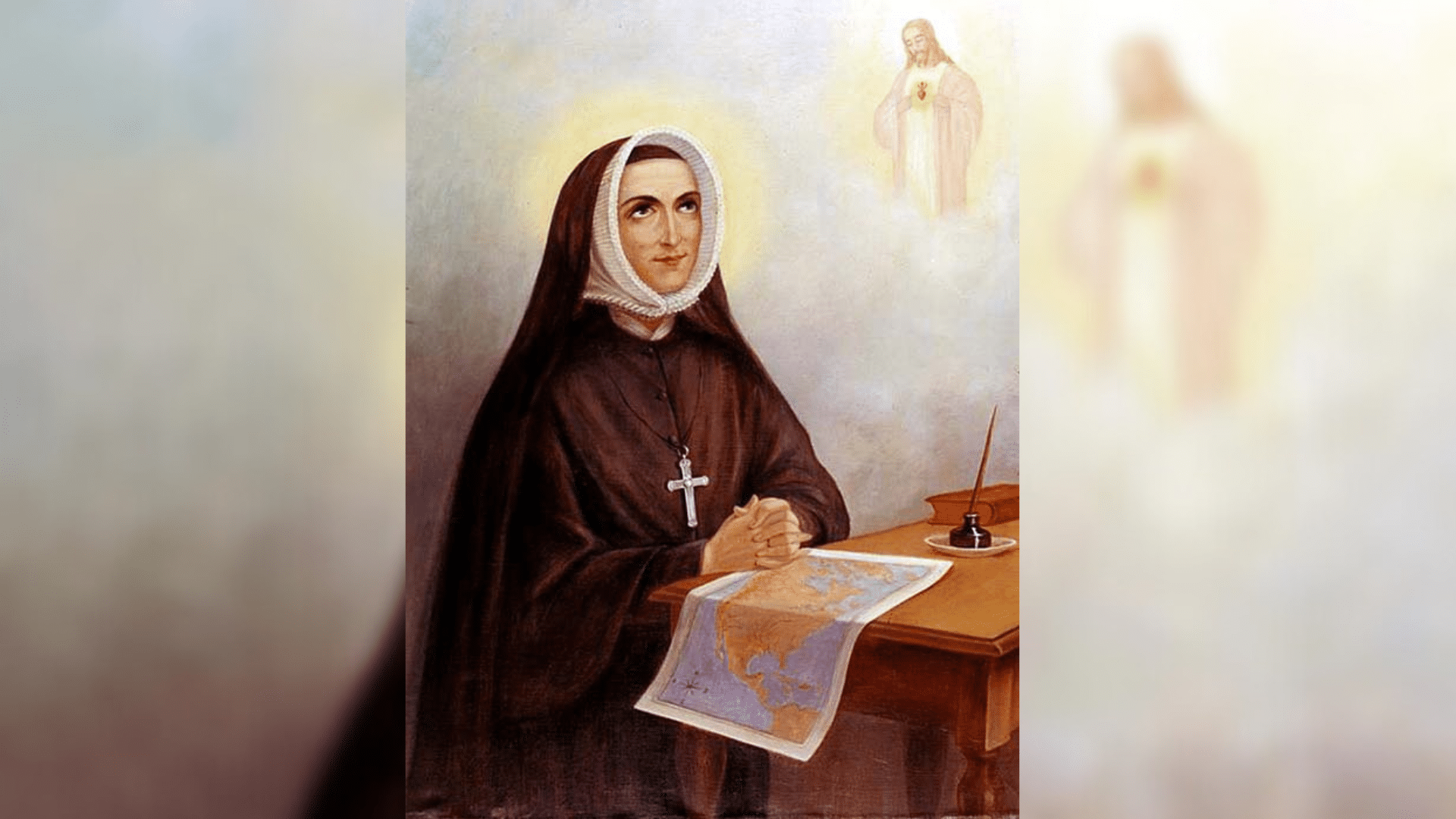A French missionary nun who helped Native Americans in the United States, St. Rose Philippine Duchesne persevered through many hardships and sickness to respond to God’s call for her along an ever-changing journey. Born in 1769 to a wealthy and influential family, she was educated in a Visitation convent and initially joined this order despite her parents’ disapproval. But when her community was dispersed during the French Revolution, she learned of a new congregation, the Society of the Sacred Heart of Jesus, where she soon became a novice. Inspired by a Jesuit priest who worked among the Native Americans living in the Louisiana Territory, St. Rose eventually became a missionary, although God first used her in her native land of France to establish a motherhouse in Paris for her new order and to support the Church through the underground during the Revolution.
It was not until 12 years later, when the bishop of the Louisiana diocese requested her help in starting a school along the Missouri River, that she began to pursue her calling as a missionary. Arriving with four other nuns at New Orleans, St. Rose and her companions were then sent to St. Charles, Missouri, where she opened schools, an orphanage, and had buildings set up for her religious order. Similar structures were established in St. Louis and in Louisiana with a focus on educating American and French Creole youth. Yet her calling to work with Native Americans was not answered until, at the invitation of another Jesuit missionary, she was sent to the Potawatomi mission of Sugar Creek, Kansas, where those who had traveled the Trail of Death resided. St. Rose Philippine Duchesne is a model of courage in assisting marginalized people despite numerous challenges.
Born into wealth, St. Rose refused to listen to her parents’ pleas that she marry even during the French Revolution when her Visitation convent closed. Instead, she began her focus on helping the poor, the sick and fugitive priests while also visiting people in prisons despite the risk involved. After anti-Catholic sentiment lessened, she chose again to become a nun, but unable to reorganize her Visitation community, St. Rose joined the Society of the Sacred Heart of Jesus. To the order’s superior, she confided the Lord’s call to her before the Blessed Sacrament to become a missionary instead of leading the contemplative life.
A missionary hope imagined before the Eucharist
In adoration before the Eucharist on the evening of Holy Thursday, St. Rose relates, “I spent the entire night in the New World … carrying the Blessed Sacrament to all parts of the land.”
Her calling was made real when she received a positive response from the bishop of the Louisiana territory looking for educators. Although her work with Native Americans did not begin immediately, St. Rose and her fellow sisters began their building projects with a log cabin at St. Charles, near St. Louis, Missouri. The work they did in teaching children often took place in extreme cold, required hard manual work and was insufficiently funded. St. Rose also had difficulty learning English. But she pushed onward and opened the first free school west of the Mississippi River and what would later become the first Catholic school in the Archdiocese of St. Louis. By 1828, St. Rose had founded six schools for the young women of Missouri and Louisiana.
Still, she longed to serve the Native American people, particularly since she was outraged by their treatment by the government at that time. When she was 72, a Jesuit missionary encouraged her order to send her to Sugar Creek, Kansas, so that she could at least pray by her powerful presence for those who had been forced to travel the Trail of Death from Michigan and Indiana to Kansas. Here she was known by the Potawatomi as Quah-kah-ka-num-ad, “Woman-Who-Prays-Always” for her long hours of contemplation.
Nevertheless, despite ill health, St. Rose also helped found a girls’ school at Sugar Creek, where half of the residents had arrived as Catholics and had requested a priest after learning about the faith in Michigan. She also assisted the sick there, many of whom had arrived in Kansas with typhoid after their long, arduous journey. Working with insufficient funding from the government, St. Rose recounts how impressed she was with the faith and work ethic particularly of the Catholic Potawatomi, who avoided drunkenness and gambling and who did not have the fierce and unkempt appearance of their pagan counterparts. She felt loved by the Potawatomi for who she was and was thrilled to see so many Potawatomi families pray the Rosary each day. Sickness, however, prevented her from staying at the Sugar Creek mission for longer than one year, and she returned to St. Charles, where she died.
St. Rose Philippine Duchesne was a flawed human being like the rest of us. Years later, she regretted the use of slaves by her order in establishing the houses built in the United States. Although using enslaved people was common at that time in the U.S., she initially found it repugnant although later chose to be a part of this practice. Her story in this regard encourages all of us to avoid the near occasion of sin in a sinful environment.
Reflection
Dear Jesus, help me to love all of your people no matter their background. May I reach out to those who are different and include them by taking care of their spiritual and physical needs.
Prayer
Almighty God, who filled the heart of Saint Rose Philippine Duchesne
with charity and missionary zeal,
and gave her the desire
to make you known among all peoples,
grant us to follow her way
and fill us with that same love and zeal
to extend your Kingdom to the ends of the earth.
Through our Lord Jesus Christ, your Son,
who lives and reigns with you in the unity of the Holy Spirit,
God, for ever and ever.








